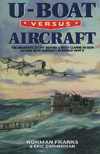The Enemy Below
Rayner, D. A.
1956, Collins, London
| Type. | Novel |
| Rating. |  |
This novel, set in 1943, follows a cat-and-mouse game between a U-boat and a destroyer who find themselves facing one another in a duel to the death. Those who are familiar with the movie by this title will find many differences between the film and this novel on which it was based. In general the book is far less sympathetic, but perhaps therefore more believable, and certainly an indicator of opinions held by some toward the Germans in the immediate postwar era.
Far from being the kindly, war-weary U-boat commander portrayed in the movie, the Kaleu of the novel, referred to frequently by the narrator as a Junker, single-mindedly pursues his mission with not the slightest bit of regard for the survival, much less the morale, of his men.
On the ocean's surface, the other partner in the coming duel is a British destroyer whose commander has long cherished the dream of engaging a U-boat in single combat. This contrasts with the movie, in which the destroyer is American, commanded by a veteran of a recent sinking and personal loss who approaches his work with the detachment of exhaustion.
Unlike in the movie, no personal wartime losses figure in the background of either commander, and there is no possibility of friendship, nor even respect, between the two captains. They are mortal enemies, and the U-boat commander is characterized using descriptions that have long featured in stereotypes of the German officer: a strict disciplinarian who will never give up, trained to obey orders and die obeying them.
The tone of the novel reflects some of the feelings of horror and bitterness felt by the Allies in the wake of the concentration camp discoveries and after six grueling years of total war. The destroyer commander voices some of these emotions when he declares "If Germany were to crack tomorrow and we were to walk in, we wouldn't find one damn Nazi in the whole of Germany. Overnight they'd all have changed to the 'good kind.' You know how we say there are good ones and bad ones. I don't believe it. They're all the same at heart. […] But they're not fixed characters. They're malleable, and can be squeezed by Hitlers or Kaisers into any chosen mold."
The book's ending, simultaneously gruesome and cynical, bears no relation to the scenes of mutual cooperation which close the movie. Overall, if the movie can be said to leave the viewer with a feeling of sentimental satisfaction, the book will leave the reader with a chilling sense of the darkness and hatreds that lurk in the human heart.
Review written by Tonya Allen.
Published on 1 Oct 2000.
Return to our main review page.



